Skukuza
| Skukuza | |
|---|---|
|
Camp entrance at Skukuza | |
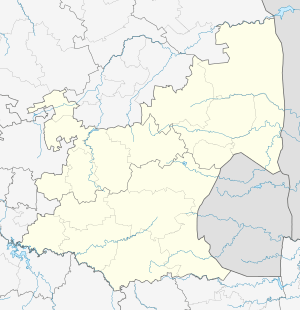 Skukuza 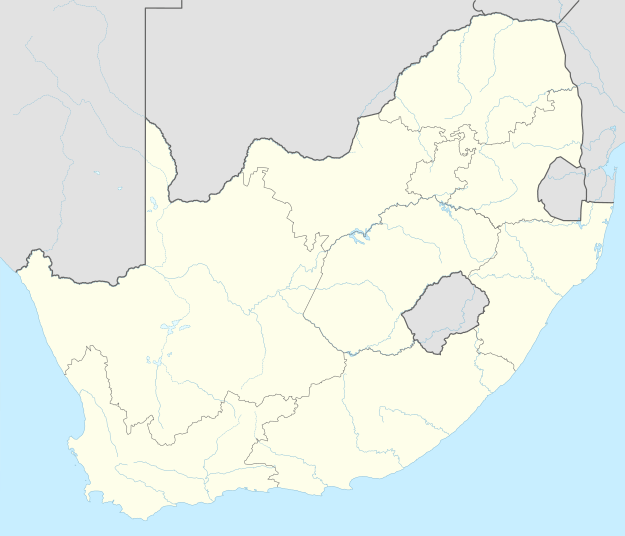 Skukuza Skukuza (South Africa) 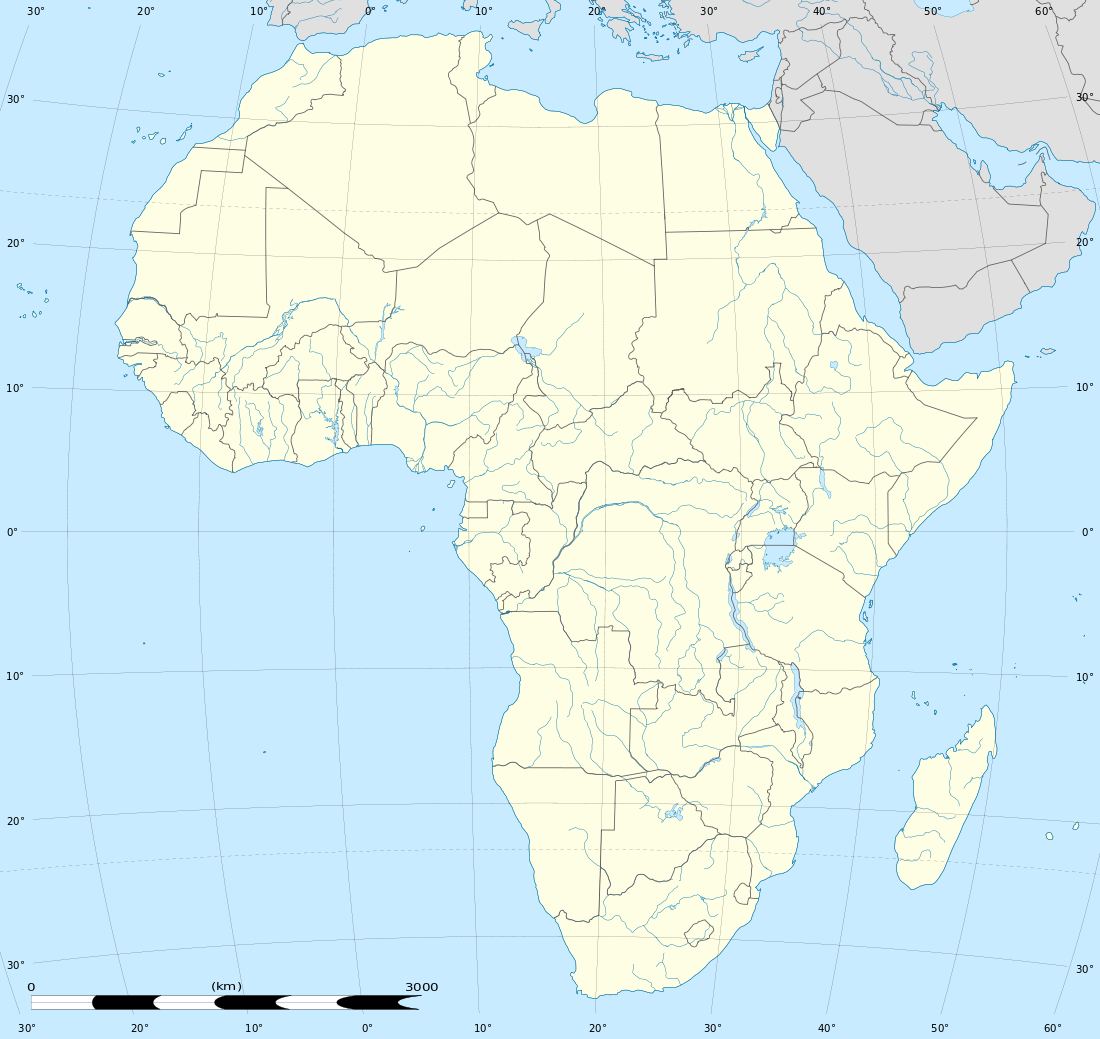 Skukuza Skukuza (Africa) | |
| Coordinates: 24°59′45″S 31°35′31″E / 24.99583°S 31.59194°ECoordinates: 24°59′45″S 31°35′31″E / 24.99583°S 31.59194°E | |
| Country | South Africa |
| Province | Mpumalanga |
| District | Ehlanzeni |
| Municipality | Mbombela |
| Government | |
| • Type | Ward 39 |
| • Councillor | Dudu Tryphinah Nkosi |
| Area[1] | |
| • Total | 4.98 km2 (1.92 sq mi) |
| Population (2011)[1] | |
| • Total | 1,599 |
| • Density | 320/km2 (830/sq mi) |
| Racial makeup (2011)[1] | |
| • Black African | 83.9% |
| • Coloured | 1.6% |
| • Indian/Asian | 0.1% |
| • White | 14.4% |
| First languages (2011)[1] | |
| • Tsonga | 58.0% |
| • Swazi | 9.7% |
| • Afrikaans | 9.5% |
| • English | 7.7% |
| • Other | 15.2% |
| Time zone | UTC+2 (SAST) |
| PO box | 1350 |
Skukuza (formerly Sabie Bridge), located 50 km east of Hazyview at the confluence of the N'waswitshaka and Sabie Rivers in Mpumalanga, is the administrative headquarters and main camp of the Kruger National Park, South Africa. It is the largest rest camp in the country and also the largest rest camp in the Kruger National Park. It is also South Africa's number one safari destination in the most popular of all game reserves in the country, highly favoured by both domestic and foreign tourists alike, for simple reasons; Africa's big five game are in abundance when compared it to all other game reserves in the country. It is situated in a high rainfall area, well wooded and thick dense forests of the southern banks of the Sabie River in Mpumalanga Province.
The name "Skukuza" was given by the local Tsonga people as a nickname for James Stevenson-Hamilton. It could be translated as 'to sweep', as Stevenson-Hamilton was perceived as to sweep the land clean of poachers and other criminals operating in the area. But according to Dr HA Junod, an expert in Tsonga history, the name Skukuza reflects the Tsonga people's attitude and resentment towards forced removal from their beautiful and fertile land. The area around Skukuza was inhabited by the Tsonga people until 1905, when they were forcibly removed by the Colonial Government as it was decided from the beginning that if the park were to succeed, no humans could be allowed in the reserve. The evicted Tsonga were resettled in villages around Hazyview, such as Hoxani, Cunningmore, Mkhuhlu and the greater Hazyview area where there was already a problem of overcrowding by large Tsonga speaking communities. Before the forced removals, the Tsonga people occupied the whole eastern part of the town of Hazyview, which is where the majority of private game reserves in Mpumalanga are situated.[2]
History
The area that surrounds present-day Skukuza was a Tsonga chiefdom under the authority of Chief Ngomane. The Tsonga people of the area hunted animals with bows and snares and eventually rifles obtained from the white men. They used the Sabie River for fishing. The land where the Skukuza camp is situated was chief Ngomane's palace (eHubyeni) and he used to conduct tribal meetings there. When the government decided to establish a national park during the late 1800s and early 1900s they sent James Stevenson-Hamilton as the only government official. British troops still occupied the area that today forms the southern part of the park after the Second Boer War. One of the locations of a British forward position was at the Sabie River in an old block house. After the troops were disbanded Stevenson-Hamilton decided to make this location his base of operations.[3] The government moved the Tsonga people to villages on the outskirts of Hazyview.
Facilities
The rest camp benefited by virtue of being classified a "white area" during the heyday of colonial and later Apartheid South Africa. As a result, the South African Government invested hundreds of millions of Rands in order to modernise and westernised South Africa's largest rest camp. Paved roads, state of the art accommodation, restaurants, Skukuza cricket club, medical suites (with resident doctors available 24-hours), safari helicopters, 18-hole golf course, conference venues, African curio shop, ATM's, a police station, staff accommodation, a primary school (Laerskool Skukuza), a church (Nederduitse Gereformeerde Kerk), indigenous plants nursery, museum, library and the most important of them all, a modern airport known as Skukuza Airport, which has 4 direct flights from both OR Tambo International Airport and Cape Town International Airport. Airlink operate the flights, which can also connects neighbouring airport at Kruger Mpumalanga International Airport in nearby Mbombela. A modern hotel, Protea Hotel Kruger gate Skukuza was also brought in by the South African government in order to service wealthy tourists, mainly from overseas, but also a fairly reasonable number of South Africans as well. The South African government also brought in safari helicopters at Skukuza in order to patrol wildlife from the sky. As a result, Skukuza tops the whole of South Africa, and indeed the whole African continent in terms of infrastructure development.
On the card now is the new Skukuza safari resort, a 5-star hotel that is currently being funded by the South African government at the cost of R250m or $25m USD. Murray and Roberts have been awarded the contract to build South Africa's only safari lodge, completion of the lodge is expected during the later part of 2018. The new hotel will be built on the piece of land adjacent the existing rest camp, according to government sources, the new hotel will boosts more than 250 luxurious rooms to meet the demands of ever increasing number of tourists that flood the rest camp throughout the year. The South African government's decision to built a new luxurious hotel is because Skukuza is always overcrowded by tourists throughout the year. For tourists who wants private outing and tranquility, they must just avoid Skukuza rest camp because almost everyone, be it South African or foreigner tourists, wants to be there.
In addition, it has a number of historical sites including 3 museums and a library, besides a camp centre consisting of shops and restaurants. The Selati Train restaurant is situated on an old train platform on the eastern verge of the camp.
From the main reception a visitor can organize game drives, bush braais and guided walks in Kruger. Besides the camp basics, Skukuza also has 2 swimming pools, a golf course, library, minor motor repairs, police station, post office and even a bank. These shops and facilities are surrounded by different sized huts, larger guest houses as well as a rustic camping terrain.
Nearby the camp is a nursery where plants native to the region can be viewed and purchased. These are mostly suited to a similarly hot climate.
There is an airport 5 km away, called Skukuza Airport, with direct flights from Cape Town and Johannesburg on a daily basis. SAA Express operates two daily from Cape Town and OR Tambo, as well as two daily flight from Skukuza to both OR Tambo and Cape Town International.
Game viewing
Skukuza is located in the southern part of Kruger and is the most popular and accessible camp, and one of the best for game viewing. In the vicinity of the camp all of the African big five can be found as well as other recognisable and exciting animals. The nearby Lake Panic hide 24°58′52″S 31°33′58″E / 24.98111°S 31.56611°E offers a vantage point of a water body from dense woodland.
The camp itself overlooks the Sabie River where elephants sometimes congregate. The stretch right opposite Skukuza is the home to a number of hippos. The trees along the river are home to very loud chacma baboons, while the piercing calls of greater galagos are heard at dawn and dusk. Wahlberg's epauletted fruit bats are easily seen under the verges of some thatched roofs. Some of these have been fitted with radio transmitters to study their feeding patterns.
Accommodation
Accommodation at Skukuza vary from small, but comfortable, bungalows to large guesthouses, suitable for tour groups. Each house has an outside braai (barbecue area) and mosquito protection. The large camping terrain has sites for caravans, motor homes and tents; campers share the ablutions, cooking and wash-up facilities. Staying at Skukuza means you are allowed to use facilities such as the swimming pools and watching free movies at the outdoor cinema.
Gallery
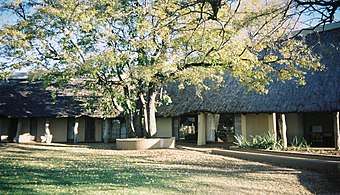 Part of the Waterkant guesthouse
Part of the Waterkant guesthouse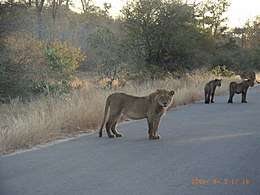 A group of lions on an early evening prowl on the H1-2 road just east of Skukuza
A group of lions on an early evening prowl on the H1-2 road just east of Skukuza Old train bridge over the Sabie River
Old train bridge over the Sabie River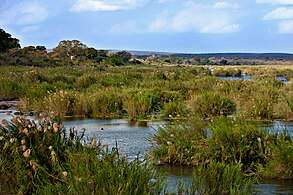 Sabie River near Skukuza
Sabie River near Skukuza- The Stevenson-Hamilton library in Skukuza
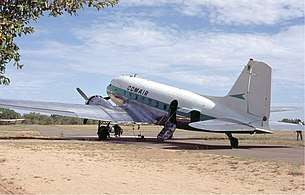 A Comair Douglas DC-3 at Skukuza in 1973
A Comair Douglas DC-3 at Skukuza in 1973
References
| Wikimedia Commons has media related to Skukuza. |
- 1 2 3 4 "Sub Place Skukuza". Census 2011.
- ↑ Raper, P. E. (1989). Dictionary of Southern African Place Names. Jonathan Ball Publishers. p. 406. ISBN 978-0-947464-04-2 – via Internet Archive.
- ↑ Stevenson-Hamilton, James (1867-1957) (2008). South African Eden: from Sabi Game Reserve to Kruger National Park. Johannesburg: Penguin. ISBN 9780143185581. OCLC 235940244.
.svg.png)